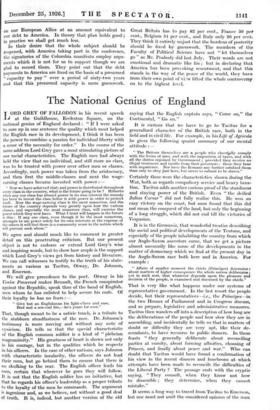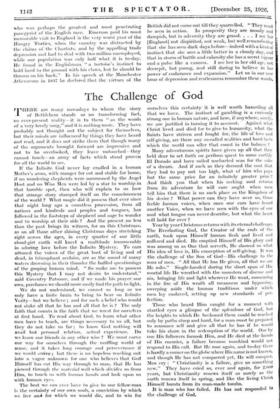The National Genius of England
1.4 ORD GREY OF FALLODON in his recent speech at the Guildhouse, Eccleston Square, on the national genius of England declared : " If I were asked to sum up in one sentence the quality which most helped the English race in its development, I think it has been the power to combine a passion for individual liberty with a sense of the necessity for order." In the course of the same address Lord Grey gave a most stimulating picture of our racial characteristics. The English race had always held the view that no individual, and still more no class, was to be trusted with power over other men or classes. Accordingly, such power was taken from the aristocracy, and then first the middle-classes and next the wage- earning classes became invested with power :— • " Now we have achieved that; and power is distributed throughout every class in the country, what is the future going to be ? Hitherto when any one class has abused power in its own interest the remedy has been to invest the class below it with power in order to protect itself. Now the wage-earning class is the most numerous, and the future of the country depends very greatly upon how the various classes, and especially tho most numerous class, will exercise the power which they now have. What I trust will happen in the future is this : If any one class, oven though it be the most numerous, attempts to use power solely for its own interests at the expense of the others it will find there is a community sense in the nation which will prevent such abuse."
We agree and should much like to comment in greater detail on this penetrating criticism. But our present object is not to endorse or extend Lord Grey's wise and inspiring words, but to show how ample is the support which Lord Grey's views get from history and literature. We can call witnesses to testify to the truth of his state- ments as various as Tacitus, Otway, Dr. Johnson, and Emerson.
We will give precedence to the poet. Otway in his Venice Preserved makes Renault, the French conspirator against the Republic, speak thus of the band of English_ men whom he has enlisted to help secure his ends. Of their loyalty he has no fears :—. •
" Give but an Englishman his light-Glove and ease, Beef and a sea-coal fire,—he's yours for ever."
That, though meant to be a satiric touch, is a tribute to the stubborn steadfastness of the race. Dr. Johnson's testimony is more moving and without any note of cynicism. He tells us that the special characteristic of the. English common soldier is a kind of " plebeian magnanimity." His greatness of heart is shown not only in his courage, but in the qualities which he respects in his officers. In the case of other nations, says Johnson with characteristic insularity, the officers do not lead their men, but go behind them to ensure that there is no skulking to the rear. The English officer leads his men, certain, that wherever he goes they will follow. It is not that the English soldier has no initiative, but that he-regards his officer's leadership as a proper tribute to the loyalty of the men he commands. The argument is ingenious and, as we believe, not without a good deal of truth. It is, indeed, but another version of the old saying that the English captain says, " Come on," the Continental, " Go on."
It is curious that we have to go to Tacitus for a generalized character of the British race, both in the field and in civil life. For example, in his Life of Agricola he gives the following quaint summary of our mental attitude :- " The Britons themselves are a people who cheerfiiilly oomply with the levies of men, and with the imposition of taxes, and with all the duties enjoined by Government ; provided they receive no illegal treatment and insults from their governors : those they bear with impatience. Nor have the Romans any further subdued them than only to obey just laws, but never to submit to be slaves."
Certainly these were the characteristics shown during the War, both as regards compulsory service and heavy taxa- tion. Tacitus adds another curious proof of the sturdiness and staying power Of the British. Even " the deified .1-Wins Caesar " did not fully realize this. He won an easy victory on the coast, but soon found that this did not' Mean the conquest of the land, but only the beginning of a long struggle, which did not end till the victories of Yespasian.
' It is in the Germania, that wonderful treatise describing the social and political developments of the Teutons, and especially of the people inhabiting the country from which our Anglo-Saxon ancestors came, that we get a picture almost uncannily like some of thc developments in the Matter Of democracy which we find at the present day in the Anglo-Saxon race both here and in America. For example : " Affairs of smaller moment the chiefs (Principes) determine s about matters of higher consequence the whole nation deliberatee ; yet in such sort, that whatever depends upon the pleasure and decision of the people, is examined and discussed by the chiefs."
That is . very like what happens under our systems of representative government. In the last resort the people decide, but their representatives—i.e., the Principes—in the two Houses of Parliament and in Congress discuss, and so prepare, legislative and administrative measures. Tacitus then wanders off into a description of how long are the deliberations of the people and how slow they are in assembling, and incidentally he tells us that in matters of doubt or difficulty they arc very apt, like their de- scendants, to have recourse to public dinners. In these feasts " they generally deliberate about reconciling parties at enmity, about forming affinities, choosing of Princes, and finally about peace and war." Who can doubt that Tacitus would have found a confirmation of his view in the recent dinners and luncheons at which attempts have been made to reconcile the difficulties of the Liberal Party ? The passage ends with the cryptic saying, " They consult, when they know not how to dissemble ; they determine, when they cannot mistake."
It seems a long way to travel from Tacitus to Emerson* but one must not omit the considered opinion of the man who was perhaps the greatest and most penetrating panegyrist of the English race. Emerson paid his most memorable visit to England in the very worst year of the Hungry 'Forties, when the country was distracted by the claims of the Chartists, and by the appalling trade depression and had to deal with two million unemployed, while our population was only half what it is to-day. He found in the Englishman " a tortoise's instinct to hold hard to the ground with his claws, lest he should be thrown on his back." In his speech at the Manchester Athenaeum in 18 IT he declared that the virtues of the British did not come out till they quarrelled. " They must be seen in action. In prosperity they are moody and dampish, but in adversity they are grand. . . . I see her [England] not dispirited, not weak, but well rernernherhe, that she has seen dark days before—indeed with a kind of instinct that she sees a little better in a cloudy day, and that in storm of battle and calamity she has a secret vigour and a pulse like a cannon. I see her in her old age, not decrepit, but young, and still daring to believe in her power of endurance and expansion." Let us in our new hour of depression and restlessness remember these words.



































 Previous page
Previous page